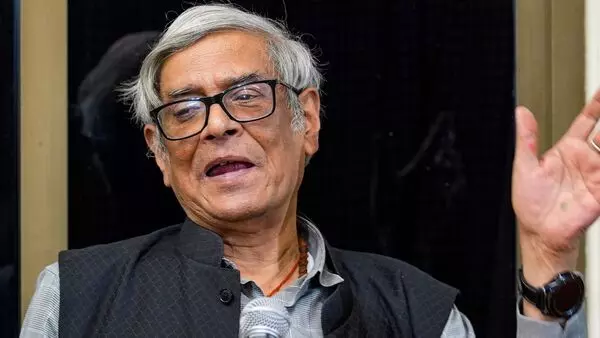
Bibek Debroy obituary | An economist and a provocateur
Bibek Debroy, an economist, chairman of PM's Economic Advisory Council (EAC-PM), will be remembered for some of his controversial statements, including seeking a new Indian Constitution

Bibek Debroy, an economist and chairman of the Prime Minister's Economic Advisory Council (EAC-PM), who passed away at the age of 69 this morning, will be remembered for some of the controversial statements he made, including seeking a new Indian Constitution and describing the existing one as part of a “colonial legacy.”
Writing for Mint newspaper on August 23, 2023, Debroy described the current Constitution as a "colonial legacy", primarily based on the Government of India Act of 1935, and suggested that merely amending it would not suffice.
New Constitution
Instead, he called for a comprehensive re-evaluation of its principles to better align with India's aspirations for 2047.
This perspective was met with fierce criticism from Opposition parties, particularly Congress, which accused him of undermining Dr B R Ambedkar's foundational work.
His views were seen as reflecting the thought process of certain key political leaders in the BJP, who could not openly articulate them, even though the backlash prompted the EAC-PM to clarify that Debroy's comments were his personal opinions and did not reflect the council's stance or that of the government.
Debroy defended his position by arguing that periodic reviews of Constitutions are common worldwide and necessary for adapting to changing societal needs. He emphasised that his intention was not to discard the existing Constitution but rather to engage in an intellectual debate about its relevance in contemporary India.
Debroy's extensive experience and contributions to economic thought led to his appointment as the chairman of the Economic Advisory Council to the Prime Minister (EAC-PM) in September 2017. In this capacity, he was tasked with providing strategic advice on economic issues and formulating policies that aligned with the government's vision for India's economic future. His role involved engaging with various stakeholders, including government officials, industry leaders, and academic experts.
Under his leadership, the EAC-PM focused on critical areas such as infrastructure development, taxation reforms, and social welfare programs. Debroy's analytical approach and commitment to pragmatic solutions earned him recognition as a key advisor within Modi's administration.
Also read: Bibek Debroy: A scholar, economist, master in classical Sanskrit texts
Taxing farmers
Debroy's proposal to tax farmers has been one of the most contentious issues he has faced. In a discussion aimed at increasing government revenue, he argued that rich farmers, particularly those who do not engage in full-time farming but instead use agriculture as a means to park unaccounted wealth, should be brought under the tax net.
Writing for New Indian Express dated January 21, 2023, Debroy said: "As the Green Revolution spread, I suspect the answer is the political clout that pressure groups of large farmers came to represent. Perversely, agricultural prosperity, not penury, led to agriculture not being taxed,” he wrote.
“As in other areas of agricultural policy, policies that benefit large farmers started to masquerade as policies for farmers. This does sound like a sweeping generalisation. But I can think of no better explanation. Which states are most luxury cars sold in? This may be an imperfect surrogate indicator, but it does tell us something,” Debroy said, prompting swift and immediate criticism.
Agricultural income in India is exempt from income tax under Section 10(1) of the Income Tax Act, 1961. In 2002, the Kelkar Committee (Task Force on Direct Tax) had pointed out that the exemption to agriculture income "distorts both horizontal and vertical equity" and "encourages laundering of non-agricultural income as agricultural income, i.e., it has become a conduit for tax evasion".
Debroy’s suggestion did not go down well with the farming community, who viewed it as an attack on them and politicians and agricultural groups immediately protested.
Debroy, a Padma Shri awardee, stated that his views were personal and did not reflect the official stance of the organisation or the government. This was an attempt to distance the government from the controversial suggestion. Government officials, including those from the ministry of finance, reiterated that there were no plans to impose taxes on agricultural income. They emphasised that agricultural income is exempt from income tax under current laws, reflecting a long-standing policy to support farmers.
Critics pointed out that while taxing agricultural income may seem reasonable, it could disproportionately affect small farmers and exacerbate existing inequalities within the agricultural sector.
Debroy's argument was rooted in the observation that many wealthy individuals exploit loopholes in tax laws, declaring substantial agricultural incomes to evade taxes.
Also read: PM's Economic Advisory Council chief Bibek Debroy passes away
Unified labour laws
During his tenure, the government think tank also advocated for unified labour laws to streamline regulations affecting businesses and improve the ease of doing business in India. This initiative aimed to create a more flexible labour market while ensuring worker protection.
Debroy remained a polarising figure whose ideas challenged traditional norms while igniting fierce debates about India's economic framework and constitutional future.

